Zoomers listen to music pretty much all day. It seems almost like some sort of addiction. People are constantly trying to bump music, they’re constantly grabbing for the “aux” to play the same songs they’ve heard ten million times. They’ll bring their speakers everywhere, they’ll have their left airpod in at all times. It isn’t that I don’t like music, but I can’t listen to the same song over and over without losing affection. I reserve my favorite songs for the gym, and only the stuff that really needs it, and even the charm of these songs eventually fades. It’s all so tiresome, finding a new song only for it to slowly feel less and less invigorating. This pickiness towards music seems to be a quality of Sensitive Young Men™, who often complain about the sheer noisiness of modernity. Schopenhauer associates misophonia, meaning “hatred of sound”, with intellect. Stupid people’s heads are empty, he thought, so they constantly are looking to fill it with noise. It doesn’t even have to be audio noise, it can be any sort of unignorable sensation. Intelligent and creative people, on the other hand, take in too much information for their own good as is, so noise serves only as a distraction. Schopenhauer was also a big fan of Music, however, and also had a profound influence on Richard Wagner. Music, at the time, was the great German art. The Dutch had their painting, and the Italians their sculpture. But the Germans had the greatest composers in the entire world, and no one could take it away from them. But maybe Schopenhauer wouldn’t have liked Music if he lived today, when much of the exposure to it is non-consensual or at the very least non-curated.
Jimmy Carter died recently. Despite being a devout Christian, John Lennon’s Imagine was played at his funeral. A song which not-so-subtly glamourizes a world without religion, without notions of “heaven” and “hell”, and celebrates the idea that their may be “nothing to live or die for”. Jimmy Carter deserved nothing more, being the Arch-Shitlib of his time. I hope he’s somewhere out there still, understanding that despite completely disagreeing with the song played at his funeral, no better song fits the legacy of his actions more. But it makes you wonder… How did John Lennon get away with this piece at the time? How did John Lennon get away with being a hippie quasi-Marxist atheist at a time where westerners were strongly against all of those things? He was one of the most popular singers in the world, and you’ll still meet plenty of Boomers in the U.S. and U.K. who love the Beatles and are simultaneously Conservative Christians. And if not that, then they probably love Queen, Elton John, or one of the other famous gay singers of the late 20th century like Tupac. The reason? They made good music. I even found my chud freak self feeling a bit of rhythm listening to ‘I’m Still Standing’ at the supermarket. And it made me wonder… How much of the Shitlib Pandora’s Box was opened up not by Hollywood, or by MSM, but by records studios?
I know the subtitle calls this a “Theory of Woke”, but I must clarify that this is slightly clickbait. This is not like the “Hanania Theory of Woke” or the “Rufo Theory of Woke” where it seeks to explain the major factor of the rise of “woke” stuff like DEI and CRT. It’s more of a post exploring a factor in Anglo-American cultural change that is often overlooked by the right.
There is a certain stereotype of a “musical Negro” that predates modern Music. Gobineau discusses it and, if I remember correctly, he ascribes rhythmic talent to the Negro at least insofar as his musical ability is outstanding relative to his other mental abilities. Blacks in America were often depicted as musical, especially associated with the Banjo which is of African origin.
Jazz and Blues arose out of the Black musical tradition in the American South, and quickly exploded in popularity. African-American religion as well as African folk religion may be the source of this Musical bone, both focus on sort of possessive rhythms in one form or another. Jews were early adopters of Jazz Music outside of the African-American community, probably most famously Benny Goodman. However, Jazz was not without its detractors. In fact, conservatives hated it. It was associated with speakeasies, sexual promiscuity, and ridiculous and perhaps even suggestive dancing. It was music that you danced to, rather than listened to. It was music fit for the up-and-coming records industry, and it was music controlled by the people who played it, the “band”, rather than the composer. Even some of the time’s shitlib intellectuals like Adorno were highly critical of it, albeit for some very different reasons. American composer Henry Cowell described Jazz as “Negro music seen through the eyes of the Jews”. Henry Ford, unsurprisingly, was a vocal critic of Jazz Music. The Nazis famously banned Jazz Music, in my opinion rightfully so, and for obvious reasons. Strangely, Evola loved Jazz. Sicilians are not beating the allegations…
Eventually, Jazz became an antique genre. Today it is seen as kind of snobby. However, all of modern music is derivative of Jazz. We remember composers from the 19th century, but with the rise of Jazz we begin to remember bands and singers. You don’t need a giant orchestra to play all Jazz, albeit Jazz orchestras do exist (in fact most schools have one) and some Jazz does require large orchestras. Jazz also just so happened to coincide with the universalization of the radio and television. Perhaps this encouraged shorter and more fast-paced pieces with a heavy singing-focus over long, drawn out orchestral. But it isn’t just the player-focused music culture that Jazz made mainstream. Pretty much every genre you can think of is derivative of R&B, which is tied into the Jazz tradition.
Even country Music, the “redneck” genre, is really a fusion between White Southern Folk music and the more Urban-influenced Blues Genre. Rock Music is even more influenced by Jazz and Blues. Black people sort of drag the “Elvis stole from Black musicians” meme but it is true that he was heavily influenced by Black musicians and Sam Phillips, Presley’s producer (and also the producer for many other famous rockstars of the time), was explicitly interested in trying to introduce Black music and culture to a White audience through Presley. Elvis had grown up going to Black churches and around mostly Black people in the deep South.
Presley had a profound influence on American youth culture in other areas as well. Before the Sexual Revolution, Americans were in a moral panic over Presley’s sex appeal. Presley played into it, with his famous hip-thrusts and whatnot. He would be the first in a long line of male singers that teenage girls across the West would fawn over, it was a force that in presley’s time was resisted with moral panic, but he was simply too beloved for the culture to stop him. Elvis’s influence is hard to understate. In many foreign countries the American stereotype is, half the time, just Elvis.
Elvis came, Elvis sang, and Civil Rights and the Sexual Revolution followed. But shortly after Elvis there was the Beatles and Psychedelic Rock. The music industry catered heavily to the Hippie countercultural movement, albeit the Beatles were less political than some people remember. Nonetheless, they were perhaps even bigger sex symbols than Elvis was, and certainly non-Traditional.
As the band became torn up by Yoko Ono, Lennon became more vocally left-wing. Despite releasing a song the vast majority of people disagreed with, Imagine received positive reception and is among the most famous songs associated with the Beatles today (despite being post-Beatles). Jewish influence in the music industry continued long after the days of Benny Goodman and George Gershwin. It is estimated that around 40% of R&B/Rock Records Companies were Jewish-owned in the post-war era. The famous Woodstock music festival was created by three Jews and one gentile, hosted on the land of a Jewish farmer. I don’t mean to suggest that Jews were conspiring to destroy Aryan civilization through Rock and Roll. However, I suspect their political liberalism and historical closeness with musicians of marginalized backgrounds contributed to the more morally loose, left-leaning popular music culture of the late 20th century in a similar manner that their influence in Law fueled Civil Rights legislation and their influence in Hollywood caused movies to reflect Jewish beliefs. Even country Music wasn’t spared from its fair share of left-wing radicals who were accepted anyways because they had “good music”. Woodie Guthrie was a Communist philosemite whose Marxist anthem somehow became a piece of Americana. Other than rock and country, the only other large genre during the 60s and 70s was soul, which was obviously very Black.
Black people seem to be directly disproportionately successful in the music industry as well, even after Jazz fell out of focus and before Hip-Hop became mainstream.
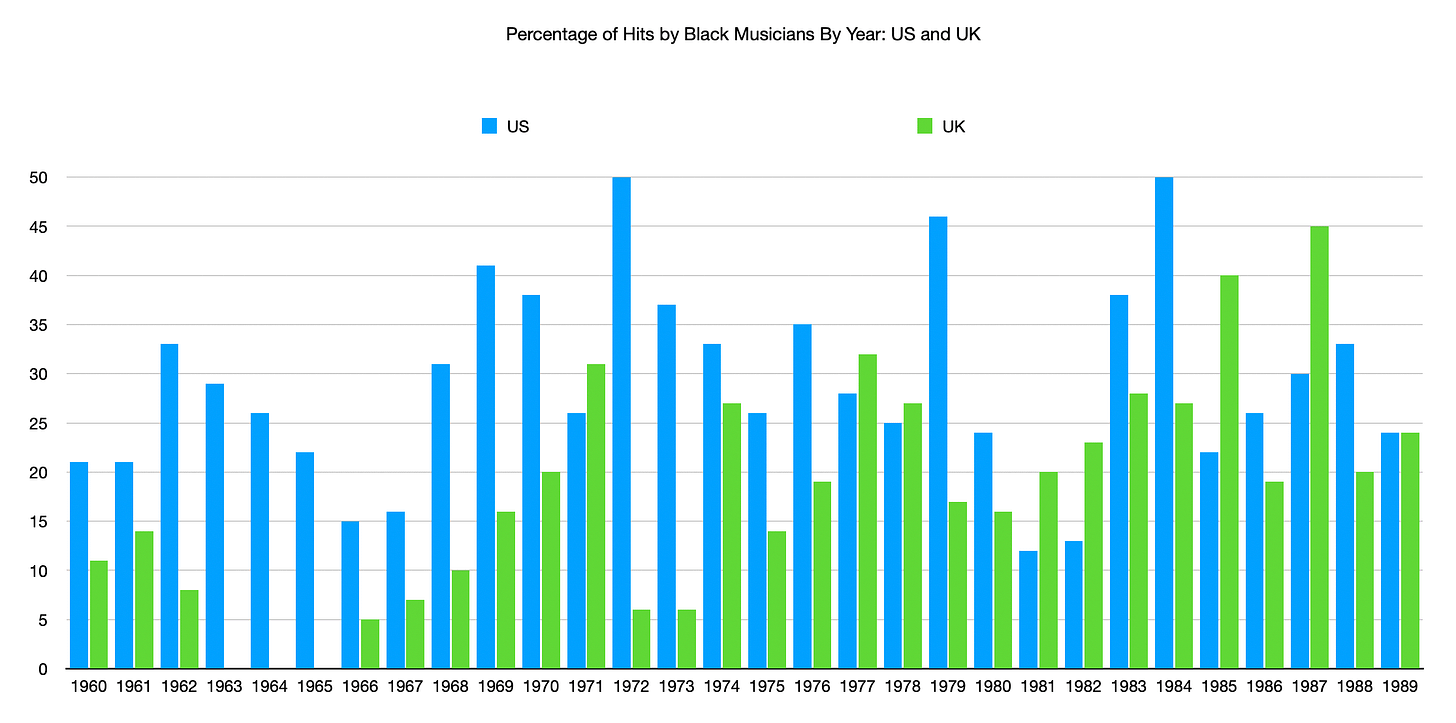
Would be interesting to do some Data Viz on the Billboard Hot 100, but I don’t know if there exist datasets which include race of the singer.
I don’t think Music was the major factor in belief changes of post-war Americans. I mostly agree with the Banania hypothesis of woke, that law went equity-focused first and everyone else followed. However it probably served as a hell of a chaser. This was the first field where Black people were willfully and successfully impressing upon the White public, and where White people were praising the merit of Black culture. With this mindset, it became hard to retain the strongly segregated society of Jim Crow Dixieland, where White and Black people weren’t even expected to eat together. And of course there was also that rise of sex in music. The sexual elements of Elvis and the Beatles were tame compared to what would come though.
In the 1970s and 1980s, there was an explosion of openly gay and bisexual musicians. American music had always been kind of gay. I’ve been told by Classical enthusiasts that American composers were very gay compared to European composers. Obviously the most famous example is Leonard Bernstein, but the aforementioned Cowell had homosexual escapades which landed him in prison. But a lot of these singers were not American, they were Britons who became wildly successful across the entire Anglosphere just as the Beatles had been a decade or two earlier.
David Bowie, Freddy Mercury, George Michael, and Elton John are the big ones. Very flamboyant about their homosexuality as well. And yet, several decades before the majority of Americans supported gay marriage or homosexuality, these pooftahs were topping the charts. In 70s, states began legalizing homosexuality. By the late 90s almost every state had legalized homosexuality. Gay Marriage was not even in people’s sights yet. That battle would have to be fought very differently, gay people had to be portrayed as “just like you” instead of “flamboyant degenerate popstar”. Even straight pop stars were well-known drug addicts and Casanovas. People liked their music, though, so they ignored it.
Today, conservatives are completely acclimated to media being “woke” and so are somewhat better at ignoring or rolling their eyes at the messaging in basically everything. But during the post-war era, people had no resistance for this sort of thing. People want to agree with their heroes, and their heroes were no longer great men of history and myth or biblical martyrs. Again, we return to this rise of “celebrity culture” in the music industry. Long ago, composers were famous and orchestras were exchangeable. Then, bands became famous. By the 2000s, it was individual singers who were famous and bands became obsolete, and today we are seeing the rise of “idols” who are basically just faces to attach to music. It’s associated with k-pop, but it’s basically true for a lot of Western singers too. They’re just less open about it. Their voice is overlaid by autotune. Their songs are written by someone else. Their tracks are given by the studio.
The rise of Rap
In the late eighties, rap music began to emerge as a popular genre especially among Black people. The above graphic downplays rap’s rise, because the ambiguous category of “pop” also becomes common around this time. A lot of pop music is heavily influenced by rap, in fact it’s hard to escape rap at all in the current year. Even country music has rap influences that are impossible to ignore. Like that fucking retarded Applebees song. Rap influenced the nu-metal of the nineties and the alt rock of the 2000s. Very noticeable when you listen to Linkin Park. I would consider rap music to be the most insidious of the genres I’ve listed. First of all, I don’t like rap music. There are a handful of individual rap songs which I enjoy, but it is probably my least liked genre. Ben Shapiro used to have one opinion that was simultaneously good and brave — that rap music was fucking garbage. But he abandoned this view to make a terrible music video with Tom Macdonald. Although the content of rap is probably what makes it a social contagion, it is really the fundamental structure of rap which makes it bad. It is a shift from melody-centric music towards rhythm-centric music. Melody is vertical, it is axial. It reminds us of the hierarchy of being. Rhythm is not bad when it is supplementary to melody, but when it takes center stage it is horizontal, it is “this” and “that over there”. It exists to possess people to shake their buttcheeks and act foolish, not recall a higher existence. Many people say it makes them feel invigorated, I experience the opposite. It makes me feel tamasic and sluggish. It’s just bad, and I don’t know how so many people think it is good. It all sounds the same to me. It’s just some black guy talking fast with a track he didn’t even produce in the background. The melody is usually added in with autotune and the background track, it has little to do with the singer if it even exists.
But enough of my personal distaste for rap, it’s no secret that rap music is *the* Black genre of modern America, and it is also a genre strongly associated with life in the ghetto and the criminal underworld. Many rap songs today are what Imagine was for its time. The lyrics are describing unacceptable behavior, but people accept it because “it’s just music” and “let people enjoy things”. Strangely enough I have noticed that 1990s gangsta rap is now a symbol of taste and status among White liberals. What Jazz was a decade ago, Tupac and Biggie are now. Rap overtook country in 2014 as the most popular genre in America aside from pop. Online sources allege a strong Jewish influence on Rap production, which wouldn’t surprise me, but I can’t find any actual stats on it like I was able to with rock.
These stats underestimate rap’s influence. Again, other genres have been influenced by rap heavily. But furthermore, there is a gender imbalance. Rap music is very popular among young men of pretty much all backgrounds. I knew country boys who were openly racist, and they still listened to rap. Eminem played a valuable role in making rap music accessible to White people. In some ways, he’s the Elvis of rap. The rise of emo-rap also made the genre accessible to chronic whiners who were more attracted to alternative, pop punk, and indie music in years prior. If you say you don’t like rap nowadays, you are called a band kid. Which is ridiculous because I’ve met band kids and they usually also like rap. Even the annoying ones.
I don’t think that rap music has a significant impact on violence or criminality. Black people have been disproportionately criminal long before rap music and White people aren’t getting any more criminal from listening to it. The bigger issue is that it encourages Afrolatry. The pre-existing Black presence in music, the urban presence of Black people, and the Black presence in pro sports already contributed to a mellowing attitude towards Blacks as “cool” (rather than goofy as they were portrayed in minstrel shows and old cartoons). However, the popularization of rap music cemented Afrolatry in American culture. Being “cool” and “masculine” as a young man in America usually involves listening to rap music. You are suspect of racism when you don’t like rap music, something that is not the case anywhere else. You aren’t suspected of racism when you dislike J-Pop or Latin music. You certainly aren’t suspected of racism for disliking country, albeit country is sort of a subgenre not associated with Whites in general. Even women are listening to rap music, which is really bad because female rappers are so bad it isn’t even funny. I mean, they suck, but furthermore they are literally trying to brag about being trashy sluts 99% of the time. At least being a criminal is kind of cool and someone who is very much not a criminal can enjoy a good story of crime. It’s not good for anyone if whoring around is glorified. People talk a lot about the effeminization of men, but not about the masculinization of women. Testosterone increases promiscuity in both sexes.
There are very masculine genres that are also very white. Metal, namely. But it’s not gonna become popular any time soon in America. Plus, it’s already kind of a Euro-thing. It’s without a doubt the most based genre in the world right now even though a lot of it sounds like dogshit. You can basically get away with liking Neo-Nazis because they are kvlt. You can listen to it at the gym too.
To summarize, much of the major phases of social liberalism in America (CRM, Sexual Revolution, Hippiedom, Gay push, Afrolatry) were preceded by a shift in the music industry towards singers who affirmed those values and forced normies to begrudgingly accept and ignore them in return for music they enjoyed. Musicians were arguably much more libertine and socially progressive in their public appearance than actors and actresses at the time, and certainly moreso than the characters those actors and actresses played. Music has been informing ideology since basically forever, with most traditional societies seeking much of their advice in the poetic epics written by their bards. If you really spend a lot of time talking to boomers and Gen-Xers, you would probably go home believing that these social attitude changes were mostly caused by musicians based on how much they glaze their favorite flaming homosexual singers and drug-addicted Casanovas from the eighties. These were their heroes growing up. The heroes of teens today are either rappers or twitch streamers. I don’t know what’s worse. It’s better to have an athlete or a pro gamer as your hero, but worse if they’re just a streamer and not even particularly good at anything.




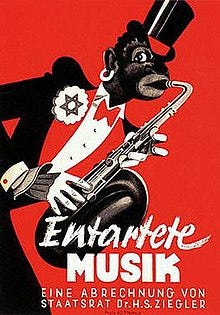
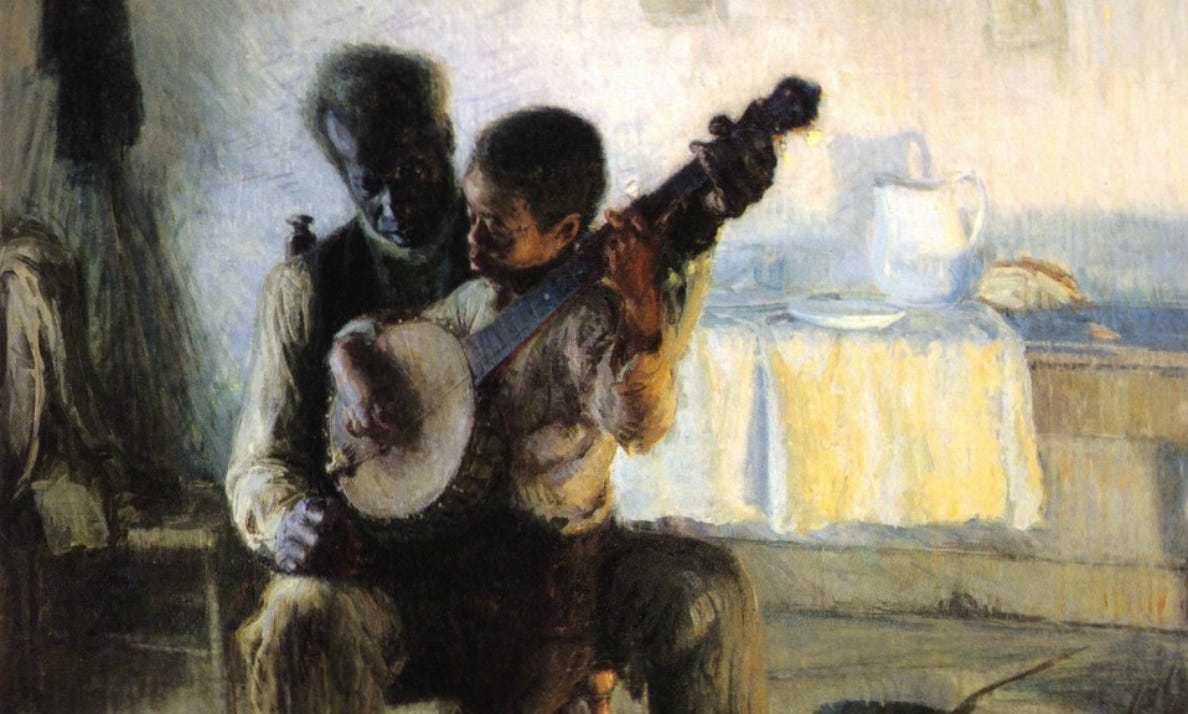
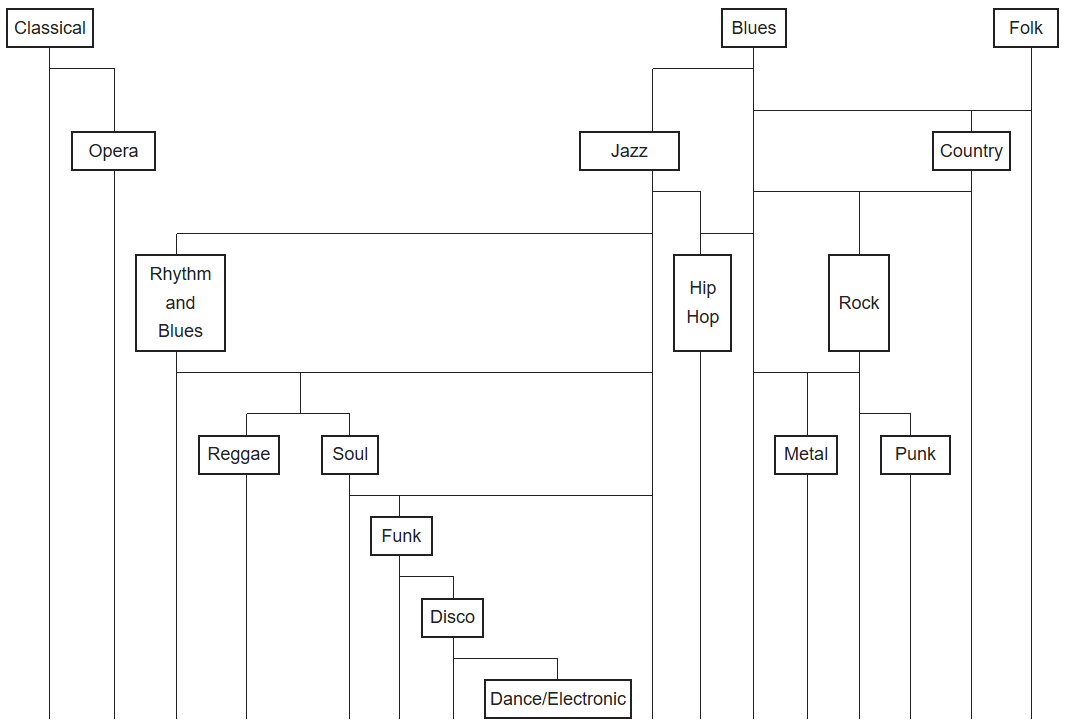
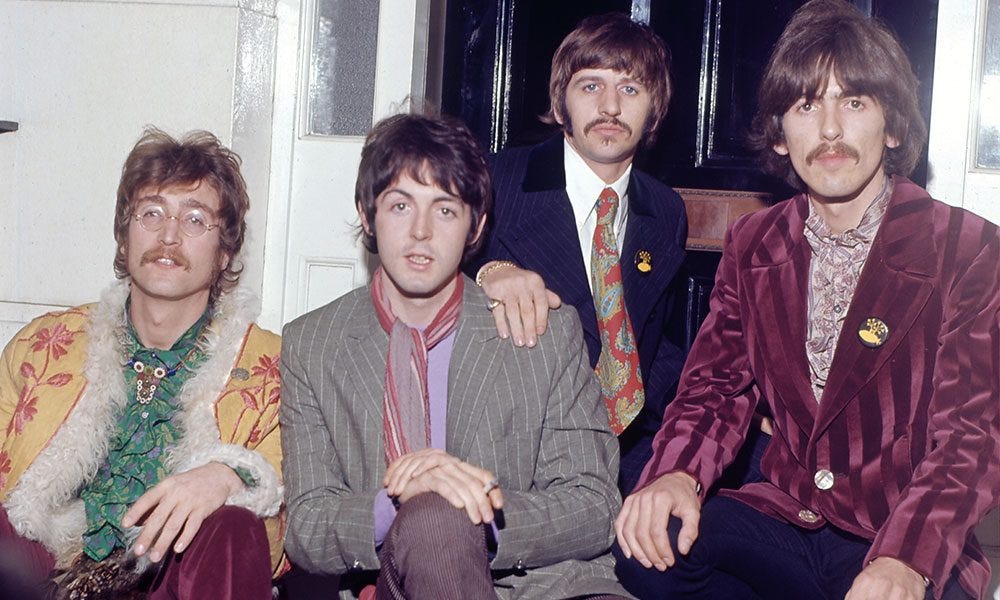
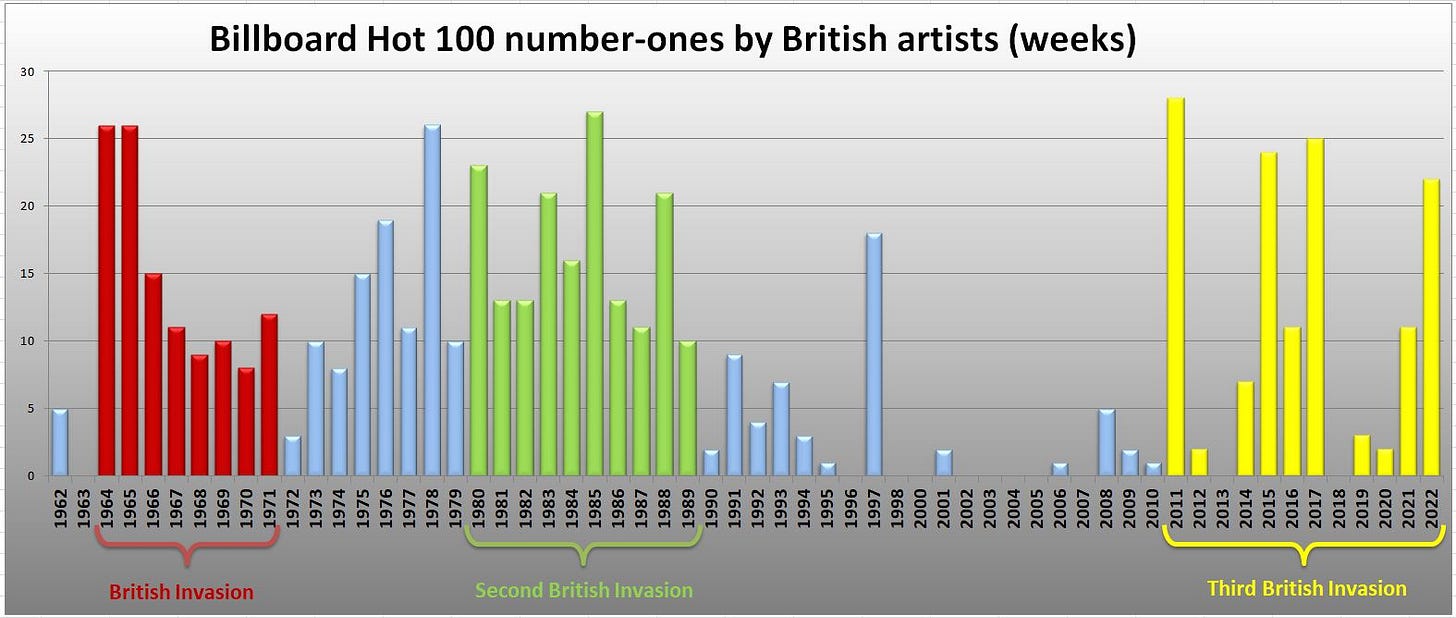
![Genre Composition of the Billboard Hot 100 Over Time [OC] : r/dataisbeautiful Genre Composition of the Billboard Hot 100 Over Time [OC] : r/dataisbeautiful](https://substackcdn.com/image/fetch/w_1456,c_limit,f_auto,q_auto:good,fl_progressive:steep/https%3A%2F%2Fsubstack-post-media.s3.amazonaws.com%2Fpublic%2Fimages%2Fce98e61e-d904-41b2-b634-b0b7c4f98c6b_1080x588.png)
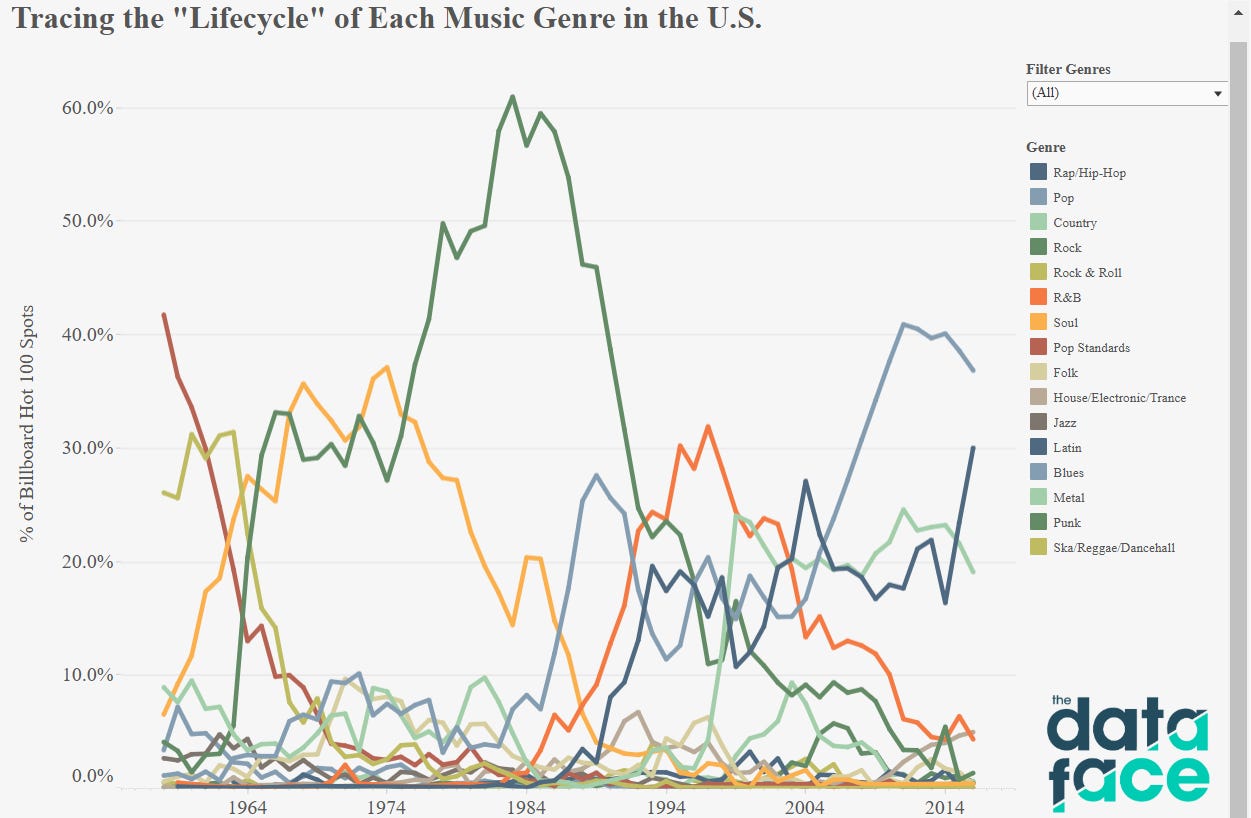
i enjoy some rap like i enjoy audiobooks, some people are able to express truth and make it funny, tell a good story, and make it rhyme in a way that tickles my autistic puzzle solving brain
“the way i am” by eminem is a song i love
cool article btw… very dense… respect
You could make a pretty convincing case the Jazz is actually just a derived form of classical music. Its main inspiration is military brass and march music. Played and refined only by the quadroon french creoles of Louisiana or the high yellows of Dixieland. When are we gonna put the white back in Jazz?